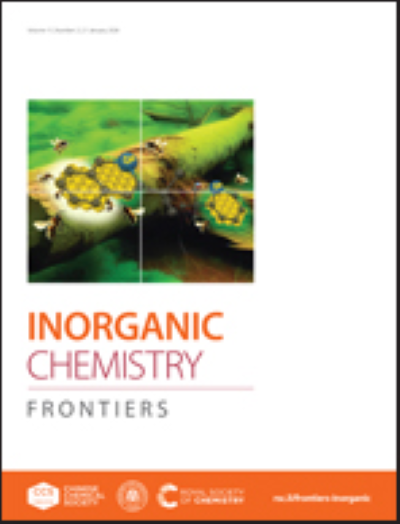si - ppc诱导的肝素/肝素酶结合亲和力的调节:一种定向分子动力学方法
IF 6.1
1区 化学
Q1 CHEMISTRY, INORGANIC & NUCLEAR
引用次数: 0
摘要
我们报告了一项定向分子动力学(SMD)研究,研究了取代惰性多核铂配合物(SI-PPCs)如何影响硫酸肝素(HS)和肝素酶之间的结合亲和力。通过模拟HS从酶活性位点的强制解离,我们证明了阳离子SI-PPCs的存在大大减少了将HS底物拉离所需的工作。与未经修饰的体系相比,这些铂配合物的存在使该体系的功平均降低了35.6%,突出了它们的“金属屏蔽”作用。对氢键和环硫酸盐夹叉形成的详细分析表明,SI-PPCs稳定了阴离子HS部分,有效地掩盖了它们不被酶裂解。在测试的配合物中,电荷和氢键容量较大的配合物形成了更稳定的非共价相互作用。这些发现为实验观察到的SI-PPCs对hs降解酶的抑制提供了机制上的见解,并为合理设计新的药物来阻止肿瘤细胞的侵袭和转移提供了途径。本文章由计算机程序翻译,如有差异,请以英文原文为准。

SI-PPC-induced modulation of heparin/heparanase binding affinity: a steered molecular dynamics approach
We report a steered molecular dynamics (SMD) investigation into how substitution-inert polynuclear platinum complexes (SI-PPCs) influence the binding affinity between heparan sulphate (HS) and the enzyme heparanase. By simulating the forced dissociation of HS from the enzyme's active site, we demonstrate that the presence of cationic SI-PPCs substantially reduces the work required to pull the HS substrate away. Compared to the unmodified system, this work decreases by an average of 35.6% in the presence of these platinum complexes, highlighting their “metalloshielding” effect. Detailed analysis of hydrogen bonding and the formation of cyclic sulphate clamps and forks revealed that SI-PPCs stabilize the anionic HS moieties, effectively masking them from enzymatic cleavage. Among the complexes tested, those with greater charge and hydrogen-bonding capacity formed more stable noncovalent interactions. These findings provide mechanistic insight into the experimentally observed inhibition of HS-degrading enzymes by SI-PPCs and offer a pathway for the rational design of new agents to hinder tumour cell invasion and metastasis.
求助全文
通过发布文献求助,成功后即可免费获取论文全文。
去求助
来源期刊

Inorganic Chemistry Frontiers
CHEMISTRY, INORGANIC & NUCLEAR-
CiteScore
10.40
自引率
7.10%
发文量
587
审稿时长
1.2 months
期刊介绍:
The international, high quality journal for interdisciplinary research between inorganic chemistry and related subjects
 求助内容:
求助内容: 应助结果提醒方式:
应助结果提醒方式:


